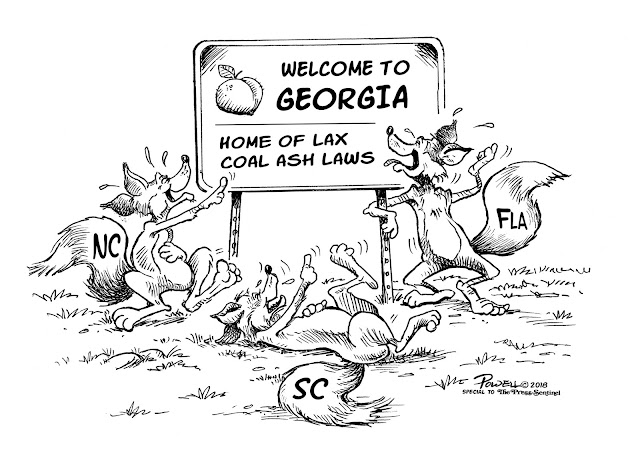The calls keep coming: “Do you
know about those long dump trucks coming out of South Carolina on I-85 South?”
Yes, I do.
Those special
side-dumping big rigs are heading to 610 Frank Bennett Road in Banks
County. Since 2015, the steady convoy
has delivered millions of tons of toxic coal ash to be dumped in the R&B
Landfill, owned and operated by Waste Management.
 Waste
Management is the industry’s biggest, with Republic Services Inc. coming in
second. The world’s richest man, Bill
Gates, has a sizable stake in both companies.
There’s a fortune in handling what others don’t want. Some states have made the smart choice: “We don’t want the long-term risk of toxic coal
ash polluting our environment.”
Waste
Management is the industry’s biggest, with Republic Services Inc. coming in
second. The world’s richest man, Bill
Gates, has a sizable stake in both companies.
There’s a fortune in handling what others don’t want. Some states have made the smart choice: “We don’t want the long-term risk of toxic coal
ash polluting our environment.”
So who is the
“lucky” sucker who gets to run that risk?
Our state—good old Georgia, the one with lower tipping fees and looser
environmental laws which roll out the welcome mat to Duke Energy and other
massive coal-ash producers.
 Yes, I had
heard about those semis streaming across Lake Hartwell’s bridge into the Peach
State. Saturday, I decided to take a
look. Without a GPS, I had no trouble
finding the Highway 51 turn-off on U.S. 441 North. A few miles down the road, another right turn
put me on Frank Bennett Road. From the
side of the narrow strip of asphalt, I craned my neck to see the earth-moving
equipment atop the mountains of trash. So high up, the yellow crawlers looked
like Tonka toys.
Yes, I had
heard about those semis streaming across Lake Hartwell’s bridge into the Peach
State. Saturday, I decided to take a
look. Without a GPS, I had no trouble
finding the Highway 51 turn-off on U.S. 441 North. A few miles down the road, another right turn
put me on Frank Bennett Road. From the
side of the narrow strip of asphalt, I craned my neck to see the earth-moving
equipment atop the mountains of trash. So high up, the yellow crawlers looked
like Tonka toys.
Banks County is
in the foothills of Appalachia. The
rolling terrain, with its lakes and streams, is a picturesque slice of natural
beauty. Before the outlet-mall
explosion—Banks Crossing—arrived on either side of I-85, Banks County was rural
and considered poor. That typically
means less educated, too. “Rural” and “poor”
are two important magnets to attract mega landfills. Just as Republic did with the acquisition of Broadhurst,
Waste Management acquired the small R&B Landfill and began adding acreage.
Before long,
the Banks County commissioners were hooked on the “easy” landfill money, and
that opened the door for what the Carolinas didn’t want. Sound familiar?
If you look at
the websites of Waste Management and Republic Services Inc. or listen to their
personnel, you’ll quickly read or hear: “We have state-of-the-art technology
and exceed government regulations.” I
don’t doubt those claims. What I doubt
is if the regulations are stringent enough to protect us from poisonous coal
ash forever. On my desk, I keep a piece
of that “state-of-the-art” plastic which is to safeguard us—forever.
Really?
But back to
those sleek semis—loaded with toxic coal ash—streaming in from the
Carolinas. And don’t forget the 800,000
tons Florida’s Jacksonville Electric Authority has already dumped in
Broadhurst. Seems our neighboring states
outthought or outfoxed Georgia on protecting its citizens.
dnesmith@cninewspapers.com


